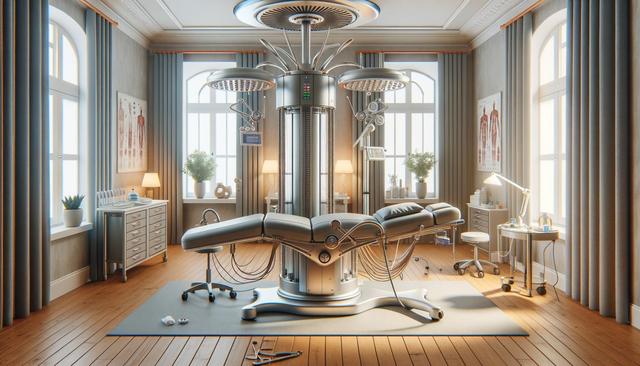Understanding the Benefits of Spinal Decompression Therapy
Spinal decompression therapy is a non-invasive treatment method designed to alleviate back pain by gently stretching the spine. This process changes the force and position of the spine, relieving pressure from compressed discs and nerves. Many individuals suffering from chronic back issues, including herniated discs, sciatica, and degenerative disc disease, have found relief through this therapy. Unlike surgical options, spinal decompression poses fewer risks and typically requires little to no recovery time.
This therapy works by creating negative pressure within the spinal discs, encouraging the retraction of herniated or bulging discs and promoting the flow of oxygen, water, and nutrient-rich fluids. These elements are essential for healing and maintaining disc health. Patients often report improved mobility and reduced pain after a series of sessions.
Some of the common conditions treated with spinal decompression include:
- Bulging or herniated discs
- Degenerative disc disease
- Posterior facet syndrome (worn spinal joints)
- Injured or diseased spinal nerve roots
- Chronic lower back or neck pain
Because of its non-surgical nature and potential effectiveness, many people are exploring spinal decompression as a way to improve spinal health and overall quality of life.
What to Expect During Spinal Decompression Treatment
When visiting a spinal decompression clinic, patients can expect a thorough evaluation to determine if they are candidates for the procedure. This evaluation may include medical history, physical examination, and imaging tests such as X-rays or MRIs. Once deemed suitable, a personalized treatment plan is created, typically involving multiple sessions over several weeks.
During each session, the patient is comfortably positioned on a motorized table, which is controlled by a computer system. The table gently stretches and relaxes the spine in predetermined cycles. Most sessions last between 30 to 45 minutes and are generally painless. In fact, many individuals find the experience relaxing.
Clinics may also incorporate complementary therapies to enhance results, such as:
- Chiropractic adjustments
- Therapeutic exercises
- Massage therapy
- Cold laser or ultrasound therapy
The effectiveness of the treatment depends on the severity of the condition, adherence to the treatment schedule, and lifestyle factors such as posture and physical activity.
How to Identify a Highly Rated Spinal Decompression Clinic
Finding a highly rated spinal decompression clinic near you is a crucial step in ensuring effective and safe treatment. Not all clinics offer the same level of care, so it’s essential to do some research before choosing one. Look for clinics with a solid reputation, experienced practitioners, and modern equipment specifically designed for spinal decompression therapy.
Key factors to consider when evaluating clinics include:
- Credentials and experience of the medical team
- Availability of comprehensive diagnostic tools
- Range of treatment options provided
- Clean, professional, and welcoming environment
- Positive feedback from previous patients
Online reviews and testimonials can offer valuable insights into patient satisfaction and clinic performance. Additionally, some clinics may offer initial consultations or assessments at no cost, which can help you gauge the clinic’s approach and professionalism before committing to a full treatment plan.
Questions to Ask Before Starting Treatment
Before beginning spinal decompression therapy, it’s wise to ask the clinic a range of questions to fully understand the process and set realistic expectations. Gathering this information can help you make informed decisions about your care and ensure the clinic aligns with your health goals.
Consider asking the following questions:
- What specific spinal decompression technology is used?
- How many sessions are typically required for my condition?
- Are there any risks or side effects I should be aware of?
- What qualifications do the practitioners have?
- Is the clinic experienced in treating my specific condition?
- Are additional therapies recommended along with decompression?
Understanding these aspects will help you feel more confident and comfortable throughout the treatment process. It also ensures that the clinic is transparent and committed to your well-being.
Maintaining Spinal Health After Treatment
Spinal decompression therapy can offer significant relief, but maintaining spinal health after treatment is just as important. Taking a proactive approach to your lifestyle can help prevent future issues and support the long-term benefits of the therapy.
Here are some tips to maintain spinal health:
- Practice good posture, especially when sitting for extended periods
- Engage in regular physical activity to strengthen core muscles
- Incorporate stretching exercises into your daily routine
- Use ergonomic furniture and supportive mattresses
- Avoid lifting heavy objects improperly
Many spinal decompression clinics also provide guidance on post-treatment care, including exercise plans and nutritional advice. Following through with these recommendations can enhance the effectiveness of your treatment and reduce the likelihood of recurring pain.
Regular follow-up visits with your provider may be necessary to monitor progress and make any needed adjustments to your care plan. By staying engaged in your recovery and wellness journey, you can enjoy a healthier spine and improved quality of life.
Conclusion: Taking the Next Step Toward Relief
If you’re dealing with persistent back pain or nerve-related discomfort, exploring spinal decompression therapy can be a valuable step. Finding a highly rated spinal decompression clinic near you ensures you receive care from experienced professionals using proven, non-invasive methods.
Take the time to research local clinics, ask thoughtful questions, and commit to a treatment plan tailored to your specific needs. With the right support and ongoing maintenance, spinal decompression therapy can be a key component in restoring your spinal health and improving your daily comfort.




Leave a Reply